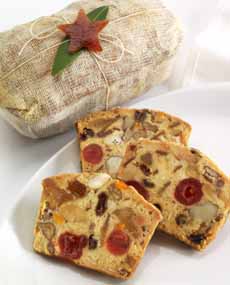TOP PICK OF THE WEEK: Rare Artisan Fruitcakes From Robert Lambert
|
|
Some people cringe at the word “fruitcake.” That’s because their experience is limited to mass-produced versions loaded with yucky neon candied fruit. If you’ve never had artisan fruitcake, made by loving hands by a gifted baker, treat yourself to one from Robert Lambert, now on sale. These are the best fruitcakes you can buy. All of the candied fruit is made by hand. There’s nothing processed or artificial. Robert Lambert’s small-batch fruitcakes are made in Marin County, California, using local fruits and rare varieties he painstakingly sources. They sell out quickly, so buy them now, even if you want them as Christmas or Thanksgiving gifts. The fruitcakes don’t go stale. In fact, Mr. Lambert sells aged fruitcakes. In addition to purchasing the current 2018 “vintage,” you can also buy 2017 and 2016. Aged fruitcake? Yes, fruitcakes including figgy pudding are typically aged for five weeks or longer, so the flavors can meld. Then there’s extra-long aging. Mr. Lambert explains: “Over time the flavors radiate out from the moisture of the fruits and peels. They intersect and form new flavor compounds. This intensifies the complexity. “In the 2-year-old cake (at the bottom of photo #2), that process is complete.” As with the 2018 vintage, the aged cakes are available in both dark and white flavors*. > Fruitcake toss day is January 3rd. > National Fruitcake Day is December 27th. > The history of fruitcake is below. Robert Lambert’s 2018 cakes all contain candied shekwasha† peel, a rare Japanese citrus. Tangy and voluptuous, it has a fruity, floral, tropical flavor with notes of lemon and pineapple—“as unique as jasmine or magnolia,” says Lambert, “an unforgettable addition to the symphony of flavors these cakes embrace.” Since Mr. Lambert’s artisan products are limited in production, head to the website now to secure yours. At $65, $75 and $85 respectively, based on vintage, they are well worth it. We assure you that everything else Mr. Lambert makes is equally delicious. He has the lead for the number of “Top Pick of The Week’ products we’ve recommended. Rich, dense fruitcake needs little garnish. Some people use whipped cream, although we prefer a dab of mascarpone or crème fraîche. To add some color, we like a piece of candied orange peel; although a few plain, julienned pieces work, too. We love a good cup of black tea with our fruitcake, or a spiced tea like Bigelow’s Constant Comment (which is also available in a decaffeinated version and a green tea version). | |
|
Port is the wine of choice, but other choices include: The earliest known recipe for fruitcake dates to ancient Rome, and included pine nuts, pomegranate seeds and raisins. By the Middle Ages, honey, preserved fruits and spices had been added and the cake was enjoyed throughout Europe. Recipes varied widely by region, incorporating local ingredients. In the 16th century, sugar from the Caribbean—and the discovery that sugar could be used to preserve fruits—made fruitcakes more affordable and popular. Wedding cakes were often fruitcakes. Everything was delicious for a few centuries. But the industrial production of prepared foods that followed World War II led to low-priced and not-great-tasting fruitcakes. Following European tradition, people still gave them as Christmas gifts, but few recipients enjoyed eating them. Many people regifted their fruitcakes; thus the joke from comedian Johnny Carson, that there was only one fruitcake in the world and it got passed from person to person. Buy or bake yourself a really good fruitcake and see why it deserves its place among the most delicious and looked-forward-to Christmas foods. ________________ *The main difference between a white fruit cake and a dark fruit cake is the sugars. Traditional dark fruit cake is made with brown sugar and molasses. White fruit cake is made with white granulated sugar. Shekwasha, Citrus depressa, is also called shequasar, Taiwan tangerine, flat lemon, hirami lemon, or thin-skinned flat lemon. It’s a small, green citrus fruit rich in flavonoids, and native to Taiwan and Okinawa. CHECK OUT WHAT’S HAPPENING ON OUR HOME PAGE, THENIBBLE.COM. |
||



